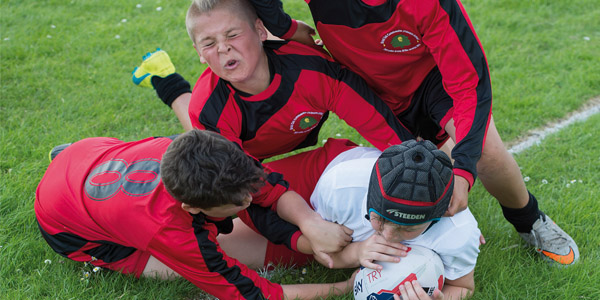Should we ban “harmful contact” from rugby games?

In a new opinion piece published in a leading medical journal, academics said that schools should ban “harmful contact” from rugby games in order to reduce the risk of injury.
Allyson Pollock and Graham Kirkwood from the Institute of Health at Newcastle University argue that most injuries in youth rugby occur due to the collision elements of the game and that tackles and scrums should be prohibited on school playing fields.
Pollock, who has been researching injuries and rugby injuries for more than ten years, and senior research associate Kirkwood said that under United Nations conventions, governments have a “duty to protect children from risks of injury”.
But the sport’s governing body say her conclusions are “simply not supported by the data and are extreme and alarmist”.
Ian Young, principal of Rainford High Technology College
The idea of banning the tackle and scrum from schoolboy Rugby Union is a position of risk management that fails to appreciate the need for balance in our approach to school, sport and life in general.
Clearly rugby is a contact and collision sport that for many people is part of its appeal alongside the skill, athleticism and teamwork that makes it one of the world’s great team games.
The game’s ethos and values of respect and teamwork that exists from schoolboy to professional level are the envy of other team games. As a society we want young people to understand and develop many of these attributes so why would we remove it from our schools.
The argument to ban the tackle and the scrum appears to be based on the risk of concussion. The risk of head injury can potentially occur in numerous accidents and on rare occasions lead to the tragic loss of life, but there is no suggestion of banning walking, running, low ceilings or travelling in cars, swinging golf clubs, cricket bats, javelins or tennis rackets. All of which are things that could cause head injury and lead to concussion.
Part of the argument to ban the collision in schoolboy rugby is that children are forced to engage in the pastime. Like many things in life, the reality is that children who enjoy the sport play to a level where collision and risk of injury increase and self-select by choosing to play. Those who don’t enjoy it sample it in PE lessons and then choose not to compete.
Living involves taking risks and playing a collision sport like rugby increases your level of risk, but the pleasure, experience and enrichment rugby has given me has outweighed those risks. Clearly injuries happen and sometimes they can be serious and even fatal but these are all part of life. As a nation we face many challenges such as childhood obesity, which I suspect is probably a greater risk than the tackle or scrum in schoolboy Rugby Union.
Anthony Albrecht, Wargrave Church of England Primary School, Newton le Willows
Having established the town’s only school full contact rugby tournament, the recent report by Prof Allyson Pollock raised concerns about parental reaction and the future of what has become a very successful event for the school.
Rugby League is sport in St Helens and the surrounding areas whether it is played at an amateur or professional level and our children aspire to become the next generation of players. Rugby, full contact rugby in particular, enthuses some of our most vulnerable and difficult to engage learners. It gives them purpose, a sense of discipline and an outlet for excess energy.
Of the four reported injuries at our tournament over the past three years, none were concussion related, largely thanks to the support and training offered by St Helens Rugby League Football Club. Three of the injuries were ankle sprains so does this mean we need to slow the pace of the game too?
As long as our children are fully prepared to receive a tackle and to tackle themselves, we will continue to promote the full contact version of the sport as an excellent way to develop physical fitness and strength in all our learners.
John Armstrong, head of rugby, St Mary’s College
This is a subject taken very seriously by all at St Mary’s College but thankfully with the aid of RFU initiatives our coaching staff feel confident to deal with any issues that may arise.
I believe more concussions are reported now which is a good thing: I seem to remember as a youngster playing in the 90s that there was very little knowledge of concussion and a general belief that you could only be concussed if you’d been knocked out. Thankfully, current understanding has greatly improved, thanks in part to online concussion courses offered by the RFU, which we ensure all our coaching staff complete.
In the past, many under 12 rugby sessions were spent teaching lineouts and scrums. These days, the RFU have done away with that so all we focus on is skills and safety in contact.
Pupils playing with people of similar ability is of paramount importance in both practices and fixtures, where great care is taken by staff to ensure even games. Thankfully we have enough pupils in Games lessons to split the group into those who are ‘contact ready’ and those who need some more help with contact skills or maybe who don’t do contact at all.
My main belief is this; yes there is a risk but I have every faith that if pupils are taught correct technique then this risk can be minimised. The values and respect taught by rugby and the pride the young people clearly take in playing for the school as well as the opportunities to travel are wonderful and long may it continue. It must however continue in an environment where staff and coaches are aware of the risks and player safety is of paramount importance.

